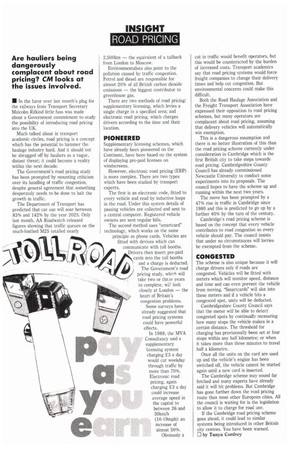INSIGHT ROAD PRICING
Page 46

If you've noticed an error in this article please click here to report it so we can fix it.
Are hauliers being dangerously complacent about road pricing? CM looks at the issues involved.
• In the furor over last month's plug for the railways from Transport Secretary Malcolm Rifkind little fuss was made about a Government commitment to study the possibility of introducing road pricing into the UK.
Much talked about in transport academic circles, road pricing is a concept which has the potential to hammer the haulage industry hard. And it should not be shrugged off by hauliers as a vague, distant threat; it could become a reality within the next decade.
The Government's road pricing study has been prompted by mounting criticism over its handling of traffic congestion, despite general agreement that something desperately needs to be done to halt the growth in traffic.
The Department of Transport has predicted that car use will soar between 83% and 142% by the year 2025. Only last month, AA Roadwatch released figures showing that traffic queues on the much-loathed M25 totalled nearly 2,5001un — the equivalent of a tailback from London to Moscow.
Environmentalists also point to the pollution caused by traffic congestion. Petrol and diesel are responsible for almost 20% of all British carbon dioxide emissions — the biggest contributor to greenhouse gas.
There are two methods of road pricing: supplementary licensing, which levies a single charge in a specified area; and electronic road pricing, which charges drivers according to the time and their location.
PIONEERED
Supplementary licensing schemes, which have already been pioneered on the Continent, have been based on the system of displaying pre-paid licenses on windscreens.
However, electronic road pricing (ERP) is more complex. There are two types which have been studied by transport experts.
The first is an electronic code, fitted to every vehicle and read by inductive loops in the road. Under this system details of passing vehicles are collected and sent to a central computer. Registered vehicle owners are sent regular bills.
The second method uses "smartcard" technology, which works on the same principle as phone cards. Vehicles are fitted with devices which can communicate with toll booths. Drivers then insert pre-paid cards into the toll booths and a charge is deducted. The Government's road pricing study, which will take two or three years to complete, will look closely at London — the heart of Britain's congestion problems.
Some surveys have already suggested that road pricing systems could have powerful effects.
In 1989, the MVA Consultancy said a supplementary licensing system charging £3 a day would cut weekday through traffic by more than 70%. Electronic road pricing, again charging £3 a day could increase average speed in the capital to between 26 and 30km/h (16-19mph): an increase of almost 50%. Obviously a cut in traffic would benefit operators, but this would be counteracted by the burden of increased costs. Transport academics say that road pricing systems would force freight companies to change their delivery times and help cut congestion. But environmental concerns could make this difficult.
Both the Road Haulage Association and the Freight Transport Association have expressed their opposition to road pricing schemes, but many operators are complacent about road pricing, assuming that delivery vehicles will automatically win exemption.
This is a dangerous assumption and there is no better illustration of this than the road pricing scheme currently under consideration in Cambridge which is the first British city to take steps towards road pricing. Cambridgeshire County Council has already commissioned Newcastle University to conduct some experiments into its proposals. The council hopes to have the scheme up and running within the next two years.
The move has been prompted by a 47% rise in traffic in Cambridge since 1980 and this is predicted to go up by a further 40% by the turn of the century.
Cambridge's road pricing scheme is based on the concept that every vehicle contributes to road congestion so every vehicle should pay. The council insists that under no circumstances will lorries be exempted from the scheme.
CONGESTED
The scheme is also unique because it will charge drivers only if roads are congested. Vehicles will be fitted with meters which will monitor speed, distance and time and can even prevent the vehicle from moving. "Smartcarde will slot into these meters and if a vehicle hits a congested spot, units will be deducted.
Cambridgeshire County Council says that the meter will be able to detect congested spots by continually measuring how many stops the vehicle makes in a certain distance. The threshold for charging has provisionally been set at four stops within any half kilometre; or when it takes more than three minutes to travel half a kilometre.
Once all the units on the card are used up and the vehicle's engine has been switched off, the vehicle cannot be started again until a new card is inserted.
The Cambridge scheme may sound far fetched and many experts have already said it will hit problems. But Cambridge has gone further down the road pricing route than most other European cities. All the council is waiting for is the legislation to allow it to charge for road use.
If the Cambridge road pricing scheme goes ahead, it could lead to similar systems being introduced in other British city centres. You have been warned.
by Tanya Cordrey
























































































